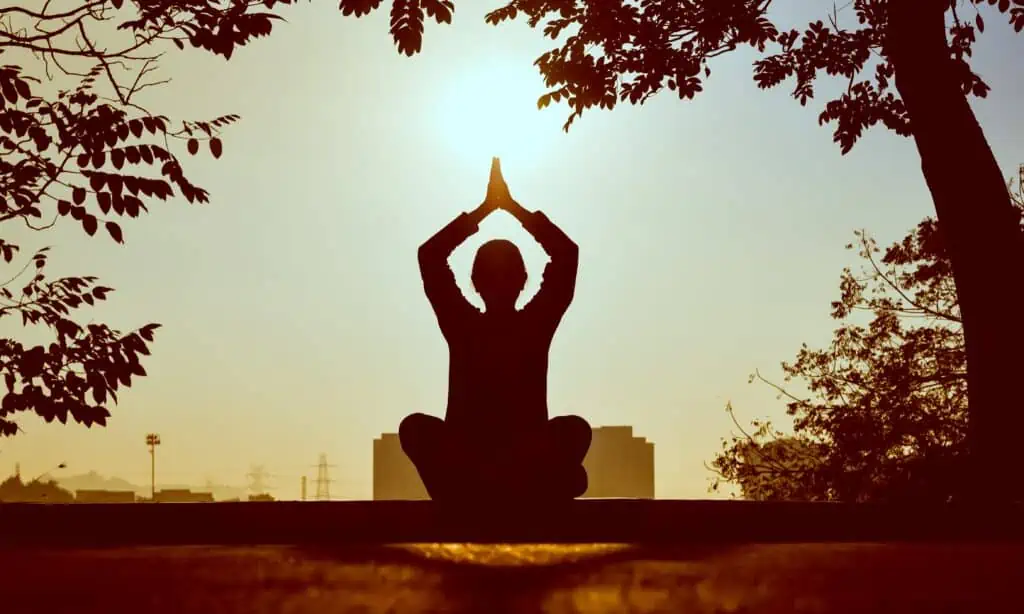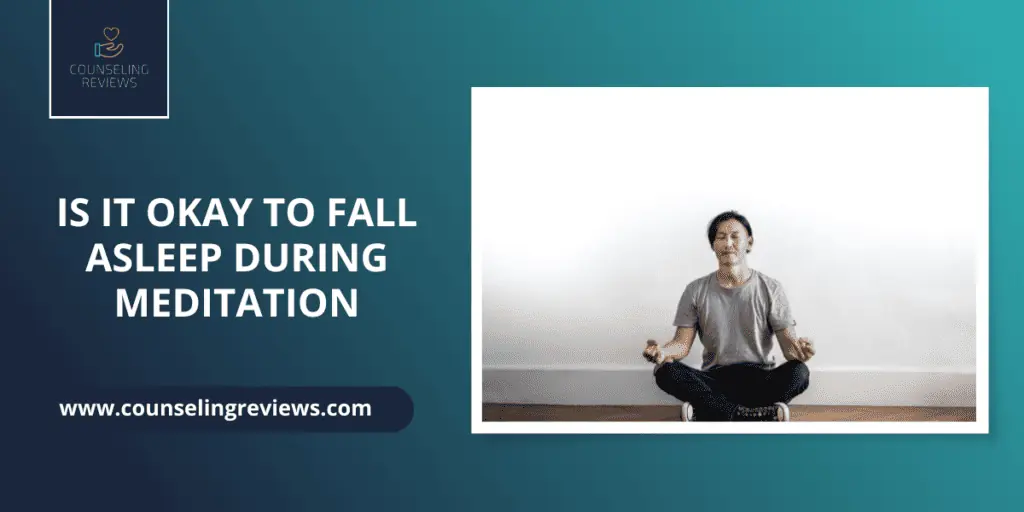According to Mayo Clinic, meditation is a form of mind-body medicine that helps you focus and minimize random thoughts. There are many forms of meditation, of which mindfulness meditation is one of the most popular. Mindfulness meditation requires you to observe your thoughts, feelings, and perceptions non-judgmentally.
Many practitioners use guided imagery, breathing techniques, relaxation exercises, etc., in combination with meditation. Research suggests meditation effectively reduces stress, anxiety, pain, high blood pressure, insomnia, and other physical and mental conditions.
Some people note that they often drift into sleep while practicing meditation. Although there is nothing wrong with falling asleep during meditation, they may prefer to remain awake. In this article, we evaluate if falling asleep during meditation is unhelpful and what you can do to stay awake.
Is it bad to fall asleep while meditating?
It’s okay to fall asleep when you are meditating. When you meditate, you may notice that you feel more relaxed than usual. This often creates the right situation for some people to fall asleep, especially when physically tired. Moreover, if you are sleep-deprived, meditation can make you feel drowsy, causing you to fall asleep involuntarily.
You may also fall asleep because you choose not to interact with unpleasant thoughts and sensations you may experience while meditating. It is important not to judge your reaction to meditation and instead continue to practice it as instructed by your therapist.
What if I sleep during meditation?
As discussed in the previous section, you may fall asleep if you are tired, sleep-deprived, or resist observing your thoughts and feelings in a non-judgmental manner. If you do fall asleep, experts suggest you continue to meditate for the duration of the session.

If you practice meditation alone, you should set the alarm so that it is not for hours when you fall asleep. In the beginning, falling asleep may be a positive sign as it helps you get some much-needed rest. After all, sleep deprivation is a severe problem that can maintain multiple mental and physical conditions.
What am I doing wrong if I fall asleep while meditating?
Meditation is a trance-like state during which you may lose awareness and alertness. You are doing nothing wrong if you fall asleep during meditation. However, if you repeatedly fall asleep during meditation every day, it is probably a sign that you have not slept well at night.
- Start with implementing sleep hygiene, which includes sleeping at a particular time, not taking caffeine after 11 AM, and ensuring you do not use the screen at least two hours before sleep.
- Choose a different time slot if you are well-rested and still feel sleepy during meditation.
- Sometimes, heat and humidity in your room can make you tired and drowsy too. Hence, try turning on the AC or the fan if that is the case.
- Do not meditate in bed. Find a slightly uncomfortable place to sit, such as the floor. You may roll a yoga mat and sit cross-legged while meditating.
- Although certain relaxation exercises such as Jacobson’s progressive muscular relation exercise (JPMR), require you to lie down, meditation is done in a sitting position. Do not lie in bed and meditate.
- Avoid wearing very comfortable clothes, which may make you drowsier. Meditating in the clothes you wore while asleep the previous night is especially not advisable.
- It is also possible that you think you are asleep but are in a meditative trance instead. The meditative state lies somewhere between being wide awake and asleep; hence, it is easy to assume you are fast asleep.
Is falling asleep while meditating the right process or wrong?
Every meditative process is different, and your instructor may have other goals before starting a meditation session for you. These goals may depend on your physical and mental conditions. If you have begun to meditate due to physical pain or hypertension, you may already have started taking medicines for these problems. These medicines may cause drowsiness which may get exacerbated during meditation.
If you meditate to reduce stress or anxiety, you may be asked to observe your thoughts and feelings without critiquing them. Your resistance toward this process may induce sleep. This is something you will need to work with your therapist or meditation instructor.
8 ways to avoid falling asleep while meditating.
If you take meditation seriously and believe in its beneficial qualities, it can be annoying when you repeatedly fall asleep during a meditation session. Here are eight tips to avoid falling asleep while meditating:
- Do not meditate the moment you wake up
Most people find it difficult to wake up in the morning as sleep deprivation is prevalent in all societies today. If you haven’t slept enough, it is easy to fall asleep the moment you begin to meditate. Give yourself time to wake up and shift your focus from sleeping altogether. You could complete your morning chores, have breakfast, and then begin to meditate. This gives your body ample time to separate sleeping and waking times. If you start meditating the first thing you wake up, it is easy to draft back into sleep.
- Let the draft in
Rooms that are well-insulated and covered promote sleep, especially in colder environments. If your room feels warm and comfortable, it is easy to fall asleep again. An easy solution is to open the windows and let the draft enter your room. If you do not have access to fresh air, turn on the fan or AC so that it feels cooler than usual. This invigorates your meditative environment and helps you remain fresh and awake.
- Meditate in a slightly uncomfortable position
Many people meditate in their beds because it is so much more comfortable. This may also be due to space constraints and limited facilities to meditate. However, it is not advisable to meditate in bed. Firstly, your posture will not be conducive to exercise. Second, it is easy to fall asleep in bed. The trick is to choose a slightly uncomfortable place to meditate, such as a cold hard floor. You can use a yoga mat if it feels uncomfortable.
- Drink a little water before meditation
Drinking water the first thing when you wake up, is an excellent way to activate your metabolism. It also helps you wake up and feel fresh. Hence, it is essential to drink a glass of water before meditating. If you meditate at a different time, you can keep a glass of water ready to drink when you feel sleepy during meditation.
- Wash your face with cold water
If you’ve ever fallen asleep in a classroom, your professor may have asked you to leave the room, wash your face, and return. This is because splashing your face with cool water helps you quickly wake up from your slumber. The moment you feel you can no longer concentrate on your meditation session due to sleepiness, walk to the bathroom and splash your face with cold water. Wipe your face and return to your meditation session.
- Sit in an upright position while meditating
As discussed previously, meditation is not the same as progressive muscular relaxation. In most societies, meditation is done sitting, especially with legs crossed. However, you may also sit on a chair during the session. The only thing you need to ensure is that you do not meditate while lying down, as that defeats the purpose.
- Don’t meditate after soon after eating
You may have noticed you feel sleepier after a huge meal. This is because your body diverts your energy toward digestive organs. You will probably feel sleepy and tired if you meditate soon after a heavy snack. It is essential to make sure that you meditate before eating. This helps ensure that you are in control of your faculties and practice meditation as intended.
- Try different postures while meditating
It is a common misconception that you must meditate only while sitting in a room. Meditation is a versatile technique to help you relax and focus on what is essential. It can be done while pacing up and down your room or even while walking in the park. However, make sure that the park is safe to walk around slowly when you are not fully alert. It is probably a good idea to sit on a park bench and meditate if walking is not suitable.
You’re Tired and Your Body Needs the Rest
If none of these tips help you meditate satisfactorily, you probably are over fatigued. There are many reasons why you may feel exhausted.
- Major depressive disorder often makes you feel tired and lethargic. It also makes you sleepier than usual, and this may aggravate during meditation.
- Chronic fatigue syndrome is another condition that makes people feel exhausted. You may feel you need to rest more if you have been diagnosed with chronic fatigue syndrome. Hence, you may fall asleep quickly during meditation.
- Other conditions that signal fatigue and drowsiness include medical conditions such as diabetes, high blood pressure, pain, etc.
Regardless of the situation you are dealing with, you must get adequate rest before meditating. Most importantly, speak to your doctor and therapist if you are a good candidate for meditation.
Don’t Wait Until You’re Too Tired to Meditate
As you can see, falling asleep during meditation is a widespread phenomenon. This can be due to several factors, such as the ambiance of your room, how tired you are, if you have slept well enough or not, and also your inherent resistance towards meditation. To make your meditation a success, you can do several things. To begin with, you can meditate when you are fully awake. You can also avoid eating just before you begin to meditate.
However, all our situations are different, and you cannot meditate at the same time as another person. If you work till late in the evening or can’t find time during the day to meditate, try to schedule your session in the morning. Trying to meditate just before sleeping or when you are exhausted are not advisable.
At the end of the day, meditation should not feel like a chore. If meditation begins to feel like work, your mind will automatically start to resist it, resulting in sleepiness. Try to work with an online therapist or counselor to understand how you can stick to a meditation regimen that works for you.





